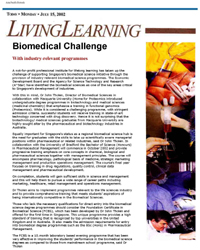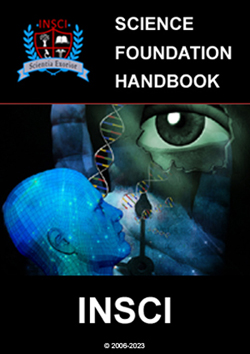Handbook Contents |
|
|
|
|
| |
Module
Descriptions |
|
|
|
|
|
|
 |
INTRODUCTION
INSCI
has extensive experience in the development and implementation
of international English taught academic programs. Moreover,
we have an intimidate understanding of the difficulties facing
non-English speaking or English as a second language students.
To ensure students who wish to participate in our international
academic programmes have the pre-requisite knowledge and ability
to apply their English skills effectively, we designed the
Science Foundation Program.
After
almost a decade creating educational opportunities for students
in Asia Pacific we are confident that our foundation syllabus
provides the optimum learning outcome for our students in
preparation for entry into English based degree programmes. INSCI worked closely with the University of Bradford, UK in
developing and implementing world class academic programmes
in Asia Pacific.
|
|
 |


|
|
INSCI objective of
"making knowledge work" is reflected by its industry
relevant programmes and in having one of the highest
employment rates for students graduating from its programs.

RATIONALE
AND PROGRAMME BENEFITS
Science
Foundation Program (SFP) has been designed to provide prospective
undergraduate students with the pre-requisite knowledge needed
for successful enrolment and academic progression through
British degree programmes. It is particularly suited to those
students who plan to enroll in life science degree programmes
or non-science professionals who are preparing for career
prospects in the life science industry sector. SFP
participants can expect a progressive development of both
their technical knowledge and their ability to apply the English
language. Students who successfully complete this program
are deemed to have met the pre-requisite knowledge requirements
and initial literacy requirements for direct entry into most
degree programs offered in countries such as the UK and Australia
It
develops the student's functional literacy within an
academic context. In this regard, particular attention
is given to the development of skills in reading, writing,
listening and speaking, which are deemed necessary for
success at university.
Why Science Foundations?
| 1. |
It
develops the student's functional literacy within an
academic context. In this regard, particular attention
is given to the development of skills in reading, writing,
listening and speaking, which are deemed necessary for
success at university |
| |
|
| 2. |
It
increases the students' technical knowledge and understanding
of scientific terminology as a further preparation for
admission into science, engineering and technology degree
programmes |
| |
|
| 3. |
Provides
a successful transition into foreign degree programmes
Students who complete the SFP have achieved excellent
performance in English taught degree programmes |
| |
|
| 4. |
It
focuses on key academic disciplines
SFP has been designed by PhD qualified foreign professionals
working in the life sciences sector in Asia Pacific. |
| |
|
| 5. |
Students are given extensive academic support |
| |
|
| 6. |
In addition to regular classes, students have access
to free, small-group tutorial support and can seek individual
consultation with academic staff. |
| |
|
| 7. |
Printed study guides
with extensive list of practice questions also help
the learning process. |
| |
|
| 8. |
It
fosters a progressive scientific knowledge development
though bi-lingual delivery with intensive English language
training. |
| |
|
| 9. |
The Science Foundations provides significant cost savings for students and their parents.
|
-
.
-
-
-
-
-
|
|

See following reviews:
 Chemistry Chemistry
 Science Foundation Science Foundation
|